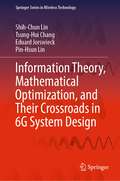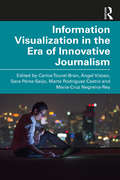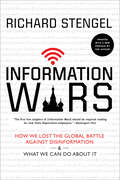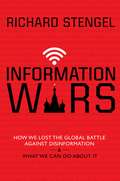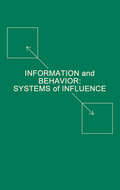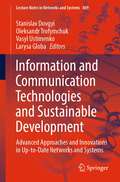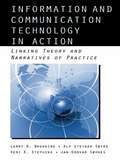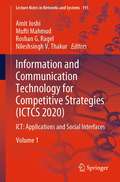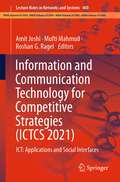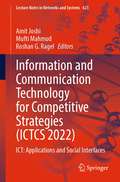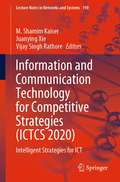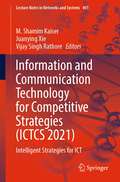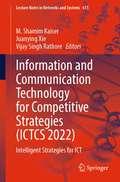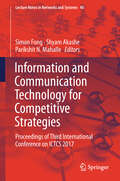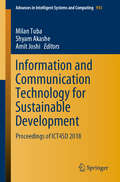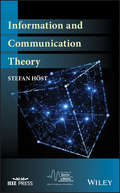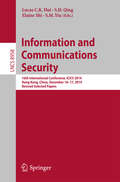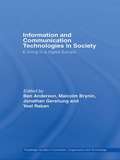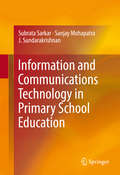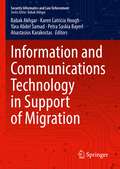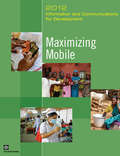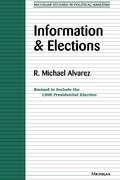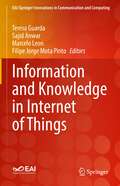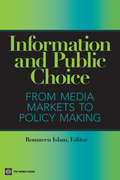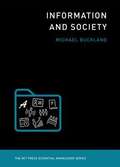- Table View
- List View
Information Theory, Mathematical Optimization, and Their Crossroads in 6G System Design (Springer Series in Wireless Technology)
by Shih-Chun Lin Tsung-Hui Chang Eduard Jorswieck Pin-Hsun LinThis book provides a broad understanding of the fundamental tools and methods from information theory and mathematical programming, as well as specific applications in 6G and beyond system designs. The contents focus on not only both theories but also their intersection in 6G. Motivations are from the multitude of new developments which will arise once 6G systems integrate new communication networks with AIoT (Artificial Intelligence plus Internet of Things). Design issues such as the intermittent connectivity, low latency, federated learning, IoT security, etc., are covered. This monograph provides a thorough picture of new results from information and optimization theories, as well as how their dialogues work to solve aforementioned 6G design issues.
Information Visualization in The Era of Innovative Journalism
by Carlos Toural-BranInformation Visualization in the Era of Innovative Journalism brings together over 30 authors from countries around the world to synthesize how recent technological innovations have impacted the development, practice and consumption of contemporary journalism. As technology rapidly progresses, shifts, and innovates, there have been immense changes in the way we communicate. This book collects research from around the world that takes an in-depth look at the primary transformations related to journalistic innovation in recent times. High-profile contributors provide cutting-edge scholarship on innovation in journalism as it relates to emergent topics such as virtual reality, podcasting, multimedia infographics, social media, mobile storytelling and others. The book pays special attention to the development of information visualization and the ability of recent innovations to meet audience needs and desires. Students and scholars studying contemporary journalism history and practice will find this a vital and up-to-date resource, as well as those studying communication technology as it relates to marketing, PR or mass media broadly.
Information Wars: How We Lost the Global Battle Against Disinformation & What We Can Do About It
by Richard StengelA “well-told” insider account of the State Department’s twenty-first-century struggle to defend America against malicious propaganda and disinformation (The Washington Post).Disinformation is nothing new. When Satan told Eve nothing would happen if she bit the apple, that was disinformation. But today, social media has made disinformation even more pervasive and pernicious. In a disturbing turn of events, authoritarian governments are increasingly using it to create their own false narratives, and democracies are proving not to be very good at fighting it.During the final three years of the Obama administration, Richard Stengel, former editor of Time, was an Under Secretary of State on the front lines of this new global information war—tasked with unpacking, disproving, and combating both ISIS’s messaging and Russian disinformation. Then, during the 2016 election, Stengel watched as Donald Trump used disinformation himself. In fact, Stengel quickly came to see how all three had used the same playbook: ISIS sought to make Islam great again; Putin tried to make Russia great again; and we know the rest.In Information Wars, Stengel moves through Russia and Ukraine, Saudi Arabia and Iraq, and introduces characters from Putin to Hillary Clinton, John Kerry, and Mohamed bin Salman, to show how disinformation is impacting our global society. He illustrates how ISIS terrorized the world using social media, and how the Russians launched a tsunami of disinformation around the annexation of Crimea—a scheme that would became a model for future endeavors. An urgent book for our times, now with a new preface from the author, Information Wars challenges us to combat this ever-growing threat to democracy.“[A] refreshingly frank account . . . revealing.” —Kirkus Reviews“This sobering book is indeed needed to help individuals better understand how information can be massaged to produce any sort of message desired.” —Library Journal
Information Wars: How We Lost the Global Battle Against Disinformation and What We Can Do About It
by Richard StengelFrom former Time editor and Under Secretary of State Richard Stengel, this is the first and only insider account of how the U.S. tried--and failed--to combat the global rise of disinformation that eventually spilled into the 2016 election. In February of 2013, Richard Stengel, the former editor of Time, joined the Obama administration as Under Secretary of State for Public Diplomacy and Public Affairs. Within days, two shocking events made worldwide headlines: ISIS executed American journalist James Foley in a graphic video seen by millions, and Vladimir Putin's "little green men"--Russian special forces--invaded Crimea, accompanied by a blizzard of Russian denials and false flags. What these events had in common besides their violent lawlessness is that they were the opening salvos in a new era of global information warfare, in which countries and non-state actors use social media and disinformation to create their own narratives and undermine anyone who opposes them. Stengel was thrust onto the front lines of this battle as he was tasked with responding to the relentless weaponizing of information by ISIS, Russia, China, and others. He saw the scale of what he was up against and found himself hopelessly outgunned. Then, in 2016, the wars Stengel was fighting abroad came home during the presidential election, as "fake news" became a rallying cry and the Russians used the techniques they learned in Ukraine to influence the election here. Rarely has an accomplished journalist been not only a close observer but also a principal participant in American foreign policy as events unfold, issues are debated, and decisions are made. Stengel takes you behind the scenes in the ritualized world of diplomacy, from the daily 8:30 morning huddle with a restless John Kerry to a midnight sit-down in Saudi Arabia with the prince of darkness, Mohammed bin Salman. The result is a compulsively readable account of how this new kind of warfare works and how difficult it is to fight. RICHARD STENGEL was the Under Secretary of State for Public Diplomacy and Public Affairs from 2013 to 2016. Before working at the State Department, he was the editor of Time for seven years, from 2006 to 2013. From 1992 to 1994, he collaborated with Nelson Mandela on the South African leader's autobiography Long Walk to Freedom. Stengel later wrote Mandela's Way, a New York Times bestseller, on his experience working with Mandela. He is the author of several other books, including January Sun, a book about life in a small South African town, as well as You're Too Kind: A Brief History of Flattery. He is an NBC/MSNBC analyst and lives in New York.
Information and Behavior: Systems of Influence (Routledge Communication Series)
by Richard A. WinettFirst Published in 1986. Routledge is an imprint of Taylor & Francis, an informa company.
Information and Communication Technologies and Sustainable Development: Advanced Approaches and Innovations in Up-to-Date Networks and Systems (Lecture Notes in Networks and Systems #809)
by Larysa Globa Stanislav Dovgyi Oleksandr Trofymchuk Vasyl UstimenkoThe book highlights the most important research areas in ICT, their impact on e-society, environment sustainable development, namely analytics, security, geoinformation systems, and mathematical modeling. The studies contain a discussion on artificial intelligence in various spheres of society, practical implementation of the IoT, geoinformation systems, and remote sensing of the earth. The book focuses on improving services providing, system architecture for SDN, forecasting social and environment sustainable development based on global information space, a new approach to radio electronics systems for the novel cloud infrastructure implementation. The results are used for novel systems and to promote new approaches for e-societies. The book offers a valuable resource for specialists of R&D organizations, the management of state administration who are involved in sustainable society development, professors, university lecturers, Ph.D. students, and bachelor and master degree students.
Information and Communication Technologies in Action: Linking Theories and Narratives of Practice
by Larry D. Browning Alf Steinar Saetre Keri Stephens Jan-Oddvar SornesThis book combines 20 stories from a variety of organizations with a selection of nine theories, both mainstream and emerging. The stories introduce readers to individuals talking about how they communicate today via information and communication technologies (ICTs) in business or organizational contexts. The theories, presented in accessible language, illuminate the implicit patterns in these stories. This book demonstrates how and why these technologies are used under myriad circumstances.
Information and Communication Technology for Competitive Strategies: ICT: Applications and Social Interfaces (Lecture Notes in Networks and Systems #191)
by Amit Joshi Nileshsingh V. Thakur Mufti Mahmud Roshan G. RagelThis book contains the best selected research papers presented at ICTCS 2020: Fifth International Conference on Information and Communication Technology for Competitive Strategies. The conference was held at Jaipur, Rajasthan, India, during 11–12 December 2020. The book covers state-of-the-art as well as emerging topics pertaining to ICT and effective strategies for its implementation for engineering and managerial applications. This book contains papers mainly focused on ICT for computation, algorithms and data analytics, and IT security.
Information and Communication Technology for Competitive Strategies: ICT: Applications and Social Interfaces (Lecture Notes in Networks and Systems #400)
by Amit Joshi Mufti Mahmud Roshan G. RagelThis book contains best selected research papers presented at ICTCS 2021: Sixth International Conference on Information and Communication Technology for Competitive Strategies. The conference will be held at Jaipur, Rajasthan, India, during December 17–18, 2021. The book covers state-of-the-art as well as emerging topics pertaining to ICT and effective strategies for its implementation for engineering and managerial applications. This book contains papers mainly focused on ICT for computation, algorithms and data analytics, and IT security. The book is presented in two volumes.
Information and Communication Technology for Competitive Strategies: ICT: Applications and Social Interfaces (Lecture Notes in Networks and Systems #623)
by Amit Joshi Mufti Mahmud Roshan G. RagelThis book contains best selected research papers presented at ICTCS 2022: Seventh International Conference on Information and Communication Technology for Competitive Strategies. The conference will be held in Chandigarh, India during 9 – 10 December 2022. The book covers state-of-the-art as well as emerging topics pertaining to ICT and effective strategies for its implementation for engineering and managerial applications. This book contains papers mainly focused on ICT for computation, algorithms and data analytics and IT security. The work is presented in two volumes.
Information and Communication Technology for Competitive Strategies: Intelligent Strategies for ICT (Lecture Notes in Networks and Systems #190)
by Vijay Singh Rathore M. Shamim Kaiser Juanying XieThis book contains the best selected research papers presented at ICTCS 2020: Fifth International Conference on Information and Communication Technology for Competitive Strategies. The conference was held at Jaipur, Rajasthan, India during 11–12 December 2020. The book covers state-of-the-art as well as emerging topics pertaining to ICT and effective strategies for its implementation for engineering and managerial applications. This book contains papers mainly focused on ICT for computation, algorithms and data analytics and IT security.
Information and Communication Technology for Competitive Strategies: Intelligent Strategies for ICT (Lecture Notes in Networks and Systems #401)
by Vijay Singh Rathore M. Shamim Kaiser Juanying XieThis book contains best selected research papers presented at ICTCS 2021: Sixth International Conference on Information and Communication Technology for Competitive Strategies. The conference will be held at Jaipur, Rajasthan, India, during December 17–18, 2021. The book covers state-of-the-art as well as emerging topics pertaining to ICT and effective strategies for its implementation for engineering and managerial applications. This book contains papers mainly focused on ICT for computation, algorithms and data analytics, and IT security. The book is presented in two volumes.
Information and Communication Technology for Competitive Strategies: Intelligent Strategies for ICT (Lecture Notes in Networks and Systems #615)
by Vijay Singh Rathore M. Shamim Kaiser Juanying XieThis book contains best selected research papers presented at ICTCS 2022: Seventh International Conference on Information and Communication Technology for Competitive Strategies. The conference will be held in Chandigarh, India, during December 9–10, 2022. The book covers state-of-the-art as well as emerging topics pertaining to ICT and effective strategies for its implementation for engineering and managerial applications. This book contains papers mainly focused on ICT for computation, algorithms and data analytics and IT security. The work is presented in two volumes.
Information and Communication Technology for Competitive Strategies: Proceedings Of Third International Conference On Ictcs 2017 (Lecture Notes in Networks and Systems #40)
by Shyam Akashe Simon Fong Parikshit N. MahalleThis book contains 74 papers presented at ICTCS 2017: Third International Conference on Information and Communication Technology for Competitive Strategies. The conference was held during 16–17 December 2017, Udaipur, India and organized by Association of Computing Machinery, Udaipur Professional Chapter in association with The Institution of Engineers (India), Udaipur Local Center and Global Knowledge Research Foundation. This book contains papers mainly focused on ICT for Computation, Algorithms and Data Analytics and IT Security etc.
Information and Communication Technology for Sustainable Development: Proceedings of ICT4SD 2018 (Advances in Intelligent Systems and Computing #933)
by Amit Joshi Shyam Akashe Milan TubaThe book proposes new technologies and discusses future solutions for ICT design infrastructures, and includes high-quality submissions presented at the Third International Conference on ICT for Sustainable Development (ICT4SD 2018), held in Goa, India on 30–31 August 2018. The conference stimulated cutting-edge research discussions among pioneering researchers, scientists, industrial engineers, and students from all around the world. Bringing together experts from different countries, the book focuses on innovative issues at an international level.
Information and Communication Theory (IEEE Series on Digital & Mobile Communication)
by Stefan HöstAn important text that offers an in-depth guide to how information theory sets the boundaries for data communication In an accessible and practical style, Information and Communication Theory explores the topic of information theory and includes concrete tools that are appropriate for real-life communication systems. The text investigates the connection between theoretical and practical applications through a wide-variety of topics including an introduction to the basics of probability theory, information, (lossless) source coding, typical sequences as a central concept, channel coding, continuous random variables, Gaussian channels, discrete input continuous channels, and a brief look at rate distortion theory. The author explains the fundamental theory together with typical compression algorithms and how they are used in reality. He moves on to review source coding and how much a source can be compressed, and also explains algorithms such as the LZ family with applications to e.g. zip or png. In addition to exploring the channel coding theorem, the book includes illustrative examples of codes. This comprehensive text: Provides an adaptive version of Huffman coding that estimates source distribution Contains a series of problems that enhance an understanding of information presented in the text Covers a variety of topics including optimal source coding, channel coding, modulation and much more Includes appendices that explore probability distributions and the sampling theorem Written for graduate and undergraduate students studying information theory, as well as professional engineers, master’s students, Information and Communication Theory offers an introduction to how information theory sets the boundaries for data communication.
Information and Communications Security
by Lucas C. K. Hui S. H. Qing Elaine Shi S. M. YiuThis book constitutes the thoroughly refereed post-conference proceedings of the 16th International Conference on Information and Communications Security, ICISC 2014, held in Hong Kong, China, in December 2014. The 22 revised full papers including two invited talks presented were carefully selected from 90 submissions. The papers provide the latest results in research, development and applications in the field of information security and cryptology.
Information and Communications Technologies in Society: E-Living in a Digital Europe (Routledge Studies in Innovation, Organizations and Technology)
by Ben Anderson Malcolm Brynin Jonathan Gershung Yoel RabanThere is a growing body of work examining the ‘consequences’, or more accurately the inter-relationships between information and communications technologies (ICTs) and society at the microsocial (individual, household) level. The vast majority of this work has so far been focused on the US and the subsequent publications have consequently provided predominantly US-centred analyses. This book will re-dress this balance by providing analyses of the situation in Europe and is associated states and placing the analyses in the context of both European and International research and policy debates. The book uses data from a range of European countries as well as comparisons with Asia and the USA. Students and academics from a range of disciplines including sociology, business and management and new media will find this book to be a valuable addition to their reading lists.
Information and Communications Technology in Primary School Education
by Sanjay Mohapatra Subrata Sarkar J. SundarakrishnanThe main focus of this monograph is to discuss the role of technology in education in emerging markets considering that many countries have attempted to reform their educational systems using large scale interventions in the last two decades. Educational change can be prompted by two exact opposites in two different settings; for example, Western countries are faced with the problem of falling enrollments whereas developing countries have to adjust to rapid acceleration in enrollments. Based on the need to bring about change, these reforms subscribe to a large diversity including attempts at restructuring school systems, curriculum revisions, pedagogical change, technological change, assessment- related changes, work condition changes, and so on. Although there have been reforms in schools over the last century, they have been only first order classroom reforms; a 'deep-seated continuity' still persists in both schooling and teaching. Educational reforms are therefore plagued with different kinds of problems: the problem of successful initial change taking place, the problem of replicating successful change in varying contexts, and the problem of institutionalization or durability of the change. Readers will also discover that American India Foundation, having worked in the educational sphere for more than a decade, intends to transform the school ecosystem through its 'Digital Equalizer' Program (DE). The program strives to foster an environment of collaborative learning by effectively empowering teachers to use technology as a pedagogic tool leading to better learning outcomes among students of under-resourced schools across India. The author sheds new light on how the DE program is affecting change in the state of Odisha's education system and the adoption of new pedagogic teaching techniques.
Information and Communications Technology in Support of Migration (Security Informatics and Law Enforcement)
by Babak Akhgar Petra Saskia Bayerl Karen Latricia Hough Yara Abdel Samad Anastasios KarakostasThe book provides a holistic review, presenting a multi-stakeholder, multi-disciplinary, international, and evidence-based approach to Information and Communications Technology (ICT) in migration. The book brings together different views and multifaceted responses to ICT-based migration management, examining their overlap, conflict, and synergies. The book is a major addition to the field, tackling important debates concerning humanitarianism and securitization in the reception of migrants, as well as exploring the role of digital technology in aiding migrant integration. The authors explore contentious areas such as the use of new technologies deployed on borders for migration management and border security under the umbrella of smart border solutions including drones, AI algorithms, and face recognition, which are widely criticized for ignoring the fundamental human rights of migrants. The research presented will depart from the euphoric appraisals that technology has made things easier for migrants and those who assist them, to critically examine the bane and boon, benefits and afflictions, highlighting the barriers, as well as the solutions, including several under-researched aspects of digital surveillance and the digital divide.This edited volume has been developed by the MIICT project, funded under the EU Horizon 2020 Action and Innovation programme, under grant agreement No 822380. Provides a positive approach to the integration of migrants, asylum seekers, and refugees using Information and Communications Technology (ICT) solutions Offers a strategic approach to providing digital services for migrants at an EU, national and local level Bridges the gap between academia and front-line practitioners’ work by providing theoretical, policy, ethical, and methodological recommendations
Information and Communications for Development 2012
by World Bank StaffWith some six billion mobile subscriptions now in use worldwide, around three-quarters of the world's inhabitants now have access to a mobile phone. Mobiles are arguably the most ubiquitous modern technology - in some developing countries, more people have access to a mobile phone than to clean water, a bank account or even electricity. Mobile communications now offer major opportunities to advance human development - from providing basic access to education or health information to making cash payments and stimulating citizen involvement in democratic processes. This 2012 edition of the World Bank's Information and Communication for Development Report analyses the growth and evolution of mobile telephony, and the rise of data-based services delivered to handheld devices, including 'apps' or smartphone applications. The report explores the consequences for development of the emerging 'app economy'. It summarises current thinking and seeks to inform the debate on the use of mobile phones for development. This report looks, in particular, at key ecosystem-based applications in agriculture, health, financial services, employment and government, with chapters devoted to each. It's no longer about the phone itself, but about how it is used, and the content and applications that mobile phones open up. Mobile applications not only empower individual users, they enrich their lifestyles and livelihoods, and boost the economy as a whole. Mobile apps make phones immensely powerful as portals to the online world. A new wave of apps and 'mash-ups' of services, driven by high-speed networks, social networking, online crowdsourcing and innovation, is helping mobile phones transform the lives of people in developed and developing countries alike. The report finds that mobile applications not only empower individuals, but have important cascade effects stimulating growth, entrepreneurship and productivity throughout the economy as a whole. Mobile communications promise to do more than just give the developing world a voice - they unlock the genie in the phone, empowering people to make their own choices and decisions.
Information and Elections
by R. Michael AlvarezR. Michael Alvarez examines how voters make their decisions in presidential elections. He begins with the assumption that voters have neither the incentive nor the inclination to be well-informed about politics and presidential candidates. Candidates themselves have incentives to provide ambiguous information about themselves, their records and their issue positions. Yet the author shows that a tremendous amount of information is made available about presidential candidates. And he uncovers clear and striking evidence that people are not likely to vote for candidates about whom they know very little. Alvarez explores how voters learn about candidates through the course of a campaign. He provides a detailed analysis of the media coverage of presidential campaigns and shows that there is a tremendous amount of media coverage of these campaigns, that much of this coverage is about issues and is informative, and that voters learn from this coverage. The paperback edition of this work has been updated to include information on the 1996 Presidential election. Information and Electionsis a book that will be read by all who are interested in campaigns and electoral behavior in presidential and other elections. "Thoughtfully conceptualized, painstakingly analyzed, with empirically significant conclusions on presidential election voting behavior, this book is recommended for both upper-division undergraduate and graduate collections. " --Choice R. Michael Alvarez is Associate Professor of Political Science, California Institute of Technology.
Information and Knowledge in Internet of Things (EAI/Springer Innovations in Communication and Computing)
by Teresa Guarda Marcelo Leon Sajid Anwar Filipe Jorge Mota PintoThis book provides readers with an insight into information and knowledge in the Internet of Things, in particular an investigation of data management and processing, information extraction, technology, knowledge management, knowledge sharing, knowledge co-creation, knowledge integration, and the development of new intelligent services available anytime, anywhere, by anyone. The authors show how IoT enables communication and ubiquitous computing between global citizens, networked machines and physical objects, providing a promising vision of the future integrating the real world of knowledge agents and things with the virtual world of information.
Information and Public Choice: From Media Markets to Policymaking
by Roumeen IslamThe ability of the media to affect outcomes in economic and political markets has been well documented. News reporting and advertising influence consumer behavior in goods and services markets by revealing (or selectively revealing) information about a product, acting as agenda setters to influence consumer demand, or enhancing competition in markets by alerting consumers to substitutes. In political markets, they can affect behavior by informing voters about a politician's views or actions, enlightening citizens to outcomes of public policy, or taking a stance on political, social, or economic issues. For businesses, households, and most others, the media is the main source of information on public policy choices and current social and economic conditions. As a result, what news the media chooses to gather, analyze and disseminate--and the slant they choose to put on what they report--is of consequence. 'Information and Public Choice' addresses the factors that affect the content and reach of news coverage as well as its impact on public policy. The book addresses both market constraints that affect media--particularly news content--and the impact that news reporting has on economic and political choices. The authors examine a range of issues, including bias or slant in media reporting, the impact of markets and nonmarket factors on news reporting, and the role of government regulation of the media sector in developing countries. The studies in this volume provide new evidence and a good summary of previous research on the power of the media. An invaluable guide for those concerned about the impact of media on economic and political outcomes, 'Information and Public Choice' draws attention to an under-researched yet important area of economics.
Information and Society
by Michael BucklandWe live in an information society, or so we are often told. But what does that mean? This volume in the MIT Press Essential Knowledge series offers a concise, informal account of the ways in which information and society are related and of our ever-increasing dependence on a complex multiplicity of messages, records, documents, and data. Using information in its everyday, nonspecialized sense, Michael Buckland explores the influence of information on what we know, the role of communication and recorded information in our daily lives, and the difficulty (or ease) of finding information. He shows that all this involves human perception, social behavior, changing technologies, and issues of trust.Buckland argues that every society is an "information society"; a "non-information society" would be a contradiction in terms. But the shift from oral and gestural communication to documents, and the wider use of documents facilitated by new technologies, have made our society particularly information intensive. Buckland describes the rising flood of data, documents, and records, outlines the dramatic long-term growth of documents, and traces the rise of techniques to cope with them. He examines the physical manifestation of information as documents, the emergence of data sets, and how documents and data are discovered and used. He explores what individuals and societies do with information; offers a basic summary of how collected documents are arranged and described; considers the nature of naming; explains the uses of metadata; and evaluates selection methods, considering relevance, recall, and precision.
